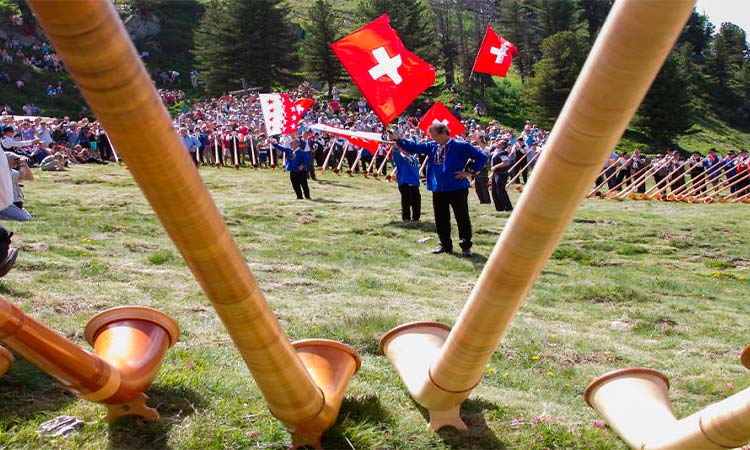Swiss festivals and traditions, getting to know the local culture
Switzerland, often characterized by its stunning landscapes, precision watches, and world-renowned chocolates, is a country that holds secrets beyond its postcard-perfect scenery. Underneath the surface of Swiss life lies a rich tapestry of festivals and traditions that offer an intimate look into the heart of Swiss culture. In this blog post, we will embark on a cultural odyssey through Switzerland, exploring the vibrant world of Swiss festivals and traditions and how they unveil the essence of the local culture.
Before you go to Swiss festivals, check out the availability of interesting excursions here - excurzilla.com
There is an excellent car rental service right at the airport - bookingauto.com
A Cultural Kaleidoscope:
Switzerland's cultural diversity is deeply rooted in its four official languages: German, French, Italian, and Romansh. This linguistic diversity has given rise to a mosaic of customs and traditions, making Switzerland a unique blend of different cultures.
1. Basel Carnival (Basler Fasnacht):
The Basel Carnival, known as Basler Fasnacht, is one of the world's most distinctive pre-Lenten carnivals. Celebrated in Basel, Switzerland's third-largest city, this carnival is a living tapestry of local traditions. What sets it apart is the strict preservation of tradition, with no cars allowed and a code of conduct for participants. The city's streets come alive with colorful masks, confetti, and elaborate costumes, offering a joyful glimpse into the city's rich culture and heritage.
2. Sechseläuten - Zurich's Spring Festival:
Sechseläuten is Zurich's way of bidding farewell to winter and welcoming spring. Celebrated on the third Monday of April, the festival revolves around the "Böögg," an effigy symbolizing winter. The faster the Böögg's head explodes in the bonfire, the better the upcoming summer is believed to be. The festival is a time for locals to don traditional clothing, participate in horse parades, and indulge in communal feasts. This event not only marks the change of seasons but also delves into Zurich's rich cultural and historical heritage.
3. Fête de l'Escalade in Geneva:
Fête de l'Escalade, celebrated on December 11th in Geneva, is an annual festival that commemorates the city's successful defense against the Duke of Savoy's invasion in 1602. During this event, locals participate in a torchlight parade and don period costumes to reenact this pivotal historical event. A highlight of the celebration is the "marmite," a chocolate cauldron filled with marzipan vegetables, symbolizing the pot used by a clever Geneva housewife to repel the invaders. Fête de l'Escalade is a captivating journey into Geneva's past and the indomitable spirit of its people.
4. Zibelemärit Onion Market in Bern:
The Zibelemärit, or Onion Market, is an annual event held in Bern on the fourth Monday in November. While onions are the main attraction, the market also features intricate onion braids, local produce, and crafts. It's an excellent opportunity to savor Swiss specialties like Zürcher Geschnetzeltes, a creamy veal dish, and raclette, a mouthwatering cheese dish. The Zibelemärit is an ideal time to connect with locals, share stories, and embrace the convivial atmosphere that defines Swiss culture.
5. Cow Parades:
Switzerland's iconic landscapes are often graced by cows grazing on lush alpine pastures. As summer transitions to autumn, these cows descend from the mountains, adorned with colorful headdresses and melodious bells, marking the end of the grazing season. The Cow Parade is a vibrant and colorful tradition where locals celebrate with music, dance, and feasts, recognizing the essential role of these animals in Swiss agriculture. This event not only showcases rural culture but also highlights the profound connection between the Swiss people and their natural surroundings.
6. Fête de l'Indépendance in Neuchâtel:
On March 1st, the city of Neuchâtel commemorates its declaration of independence from the Kingdom of Prussia with the Fête de l'Indépendance. Locals don historical costumes and reenact this significant historical moment. The festival includes a grand parade, culinary delights, and lively street performances, providing visitors with a chance to immerse themselves in Swiss history and identity.
7. Désalpe:
The Désalpe, or "cows' descent," is one of the most breathtaking Swiss traditions. As summer draws to a close, cows adorned with flowers and bells descend from alpine pastures to the valleys. Spectators gather to witness this centuries-old tradition, with some even crowning the cows with flower wreaths as they descend, creating a stunning and unforgettable spectacle that underscores the harmony between Swiss culture and nature.
8. Swiss National Day:
Swiss National Day, celebrated on August 1st, is a time for patriotic fervor and community gatherings. Fireworks light up the skies over lakes and mountains, and people come together for barbecues, picnics, and music. The festivities are not confined to a specific city or region; they are a nationwide celebration of Swiss identity and unity.
Conclusion:
Swiss festivals and traditions offer an intimate look into the diverse and rich culture of this Alpine nation. Whether you're drawn to the lively energy of Basler Fasnacht, the historical significance of Fête de l'Escalade, or the picturesque Désalpe, these events showcase the heart and soul of Switzerland. Planning your visit to coincide with one of these festivities provides an opportunity to not only witness the spirit of the Swiss people but also become a part of their cherished traditions, leaving you with lasting memories and a deeper connection to this enchanting country. So, when planning your next trip to Switzerland, be sure to experience its festivals and traditions for a memorable journey into the heart of local culture.











Comments
Post a Comment